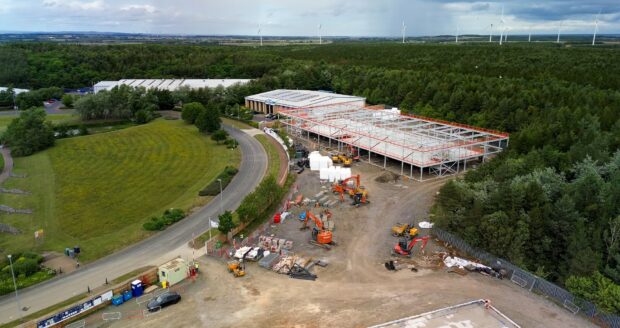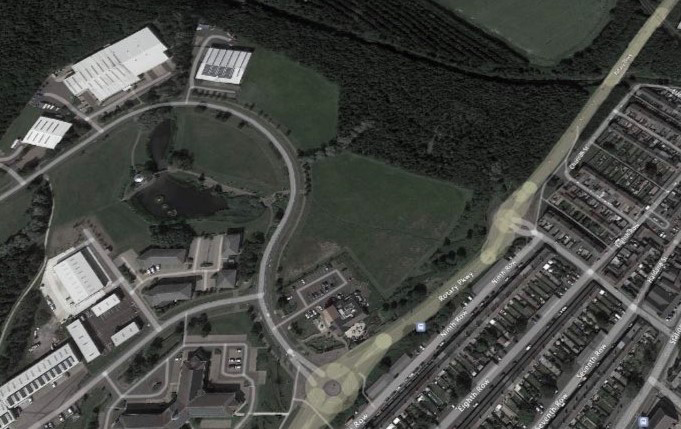Northumberland College has confirmed its new Ashington Campus will be a ground-breaking ‘Gen Zero’ development – designed to be as close as possible to carbon neutral in both construction and operation.
Earlier this year Education Partnership North East (EPNE) revealed it was purchasing a tract of land for Northumberland College on the Wansbeck Business Park and the 5.7 acre site would be developed by the Department for Education (DfE) into a state-of-the-art, new technical college campus.
The college’s plans for the hour glass-shaped site include three buildings which will house an industry standard advanced manufacturing, engineering and construction skills centre; a green transport, automotive and logistics hub; and a technical college build including digital classrooms, virtual reality environments, a simulated hospital, health and social care facility, employability facilities, a centre for young people with special educational needs, along with offices, a car park and sports facilities.
Architects Race Cottam are designing the campus while leading UK construction company Bowmer + Kirkland has been appointed to build the development.
Now the college and the DfE have confirmed the campus will be Gen Zero – the first in a new generation of further education buildings designed to be ultra-low carbon in both construction and operation.
Ellen Thinnesen, Chief Executive of EPNE, said: “We’re tremendously proud and excited to be working in partnership with the DfE on this pathfinder project which will be used as a prototype for future college and school buildings.
“We wanted our new Ashington Campus to play into the region’s net zero ambitions, but the Gen Zero designs take it to the next level.”
To reduce its carbon footprint, innovative, sustainable designs and materials along with modern methods of construction will mean the college campus is largely being built and manufactured off site before being assembled in Ashington.
Ellen explained: “Our campus will be built to a systems-based design and manufactured in a factory setting. The spaces will be undefined by fixtures and fittings allowing for huge flexibility in terms of curriculum models and classrooms.
“This means the approach to design, build and operation significantly reduces the constraints of restricted space, facilitates sustainable curriculum and resources that can flex to future industry need and integrates state-of-the-art technology and biophilic principles to enhance health and wellbeing for studying and working in the building. And at a time when energy costs are rising, this state-of-the-art campus will put energy back into the grid.
“The design, from Innovate UK working with the DfE, will provide a resilient campus, allowing for different curriculum and skills models.”
A sophisticated heating and heat recovery system will incorporate solar panels and heat ‘scavenged’ from kitchens and changing rooms. Hot water will be provided by air source heart pumps and stored in innovative cylinders.
The buildings will have ‘timber envelopes,’ the material chosen as a natural and renewable resource, which is easy to source and available in small quantities if, and when, needed.
Furniture will be standardised, mobile and modular, a further strategy to reduce waste and redefine the classroom of the future.
The innovative design will include a fresh approach to technology: flexible technology and systems will mean students and staff will not be confined to restricted IT zones meaning they will be able to work with greater agility and mobility, a model that will enhance digital accessibility for all.
The tech strategy will include the provision of a top of the range 360-degree immersive hub, similar to the recently opened Innovation Space at Sunderland College, which is also part of the EPNE group.
External spaces will be just as important as the internal spaces at the campus, with the landscape surrounding the buildings incorporating major tree planting (which will act as solar screening) and rain gardens, while pathways will be made of carefully chosen sustainable materials.
Ellen explained: “Accessible outside spaces can have a hugely beneficial effect on the health, wellbeing and educational attainment of learners. Our campus will have spaces for outdoor learning, physical and social activities as well as horticultural areas, trees, and bike stores – a key part of our ‘greenification’ agenda.
“Our new Ashington Campus won’t just be a wonderful environment where our students can learn and our staff can work, it will also play an important role in the Government’s Levelling Up agenda. The skills agenda and a well-trained workforce aligned to the needs of local economies are fundamental to the success of Levelling Up. There’s no doubt our college of the future will make an important contribution in that direction – as well as helping to save the planet.”
Michael Black, Director of Economic Growth and Investments at Advance Northumberland, said: “It is fitting that this pioneering Gen Zero College Campus is being developed in the heart of Ashington town centre, on Wansbeck Business Park. The park is part of a network of energy-led strategic employment sites that we have developed specifically to attract some of the worlds most advanced, clean energy investments in offshore wind and automotive electrification. This exciting new facility will play a key role in improving employment opportunities in these sectors, not just for Ashington but for students throughout Northumberland.”
Jeff Watson, Chair of Advance Northumberland, said “The investment being made into this state-of-the-art Gen Zero Campus, is in direct alignment with Advance Northumberland and Northumberland’s County Councils ambition to unlock economic growth through the transition to a low carbon economy.
Not only will the new campus demonstrate ultra-low carbon construction and operational credentials but significantly, it will provide learners from across Northumberland and the wider region with a fantastic learning experience with career pathways into the county’s key growth sectors, ensuring opportunities for inclusive growth for our residents and communities.”
Coun Glen Sanderson, Leader of Northumberland County Council, said: “We’re delighted at the progress on this flagship educational facility and its aspirations to be as close as possible to carbon neutral.
“A state-of-the-art campus in the centre of Ashington will be a real boost not just for Northumberland College but the whole of the town and the wider area. The ambitions of Northumberland College reflect those of the county as a whole and we’re looking forward to continuing to help them as this scheme moves forward.”
College updates
-

‘Trailblazing’ Ashington Campus begins to take shape
July 8, 2025
Northumberland College’s new Ashington Campus is starting to take shape as the £52 million development enters its next phase.
-

Work underway on transformative ‘net zero’ Ashington Campus
February 18, 2025
Construction of Northumberland College’s £52m+ Ashington Campus has begun after receiving full approval from the Department for Education.
-

Transformative new partnership to provide visible NHS career pathways ...
January 28, 2025
Northumberland College & Northumbria Healthcare NHS Foundation Trust are partnering to ensure NHS career pathways are more accessible.

Why Education Partnership North East (EPNE)?

Highly commended - Employer of the Year, Sunderland Echo Portfolio Awards 2019

Engagement with Employers - Association of Colleges (AoC) Beacon Award 2017
(Sunderland College On-programme Survey 2017)

Selected by DfE for 2021 T Level pilot to deliver the new high-quality technical qualifications.

98% overall employer satisfaction - Employer Survey 2018/19


